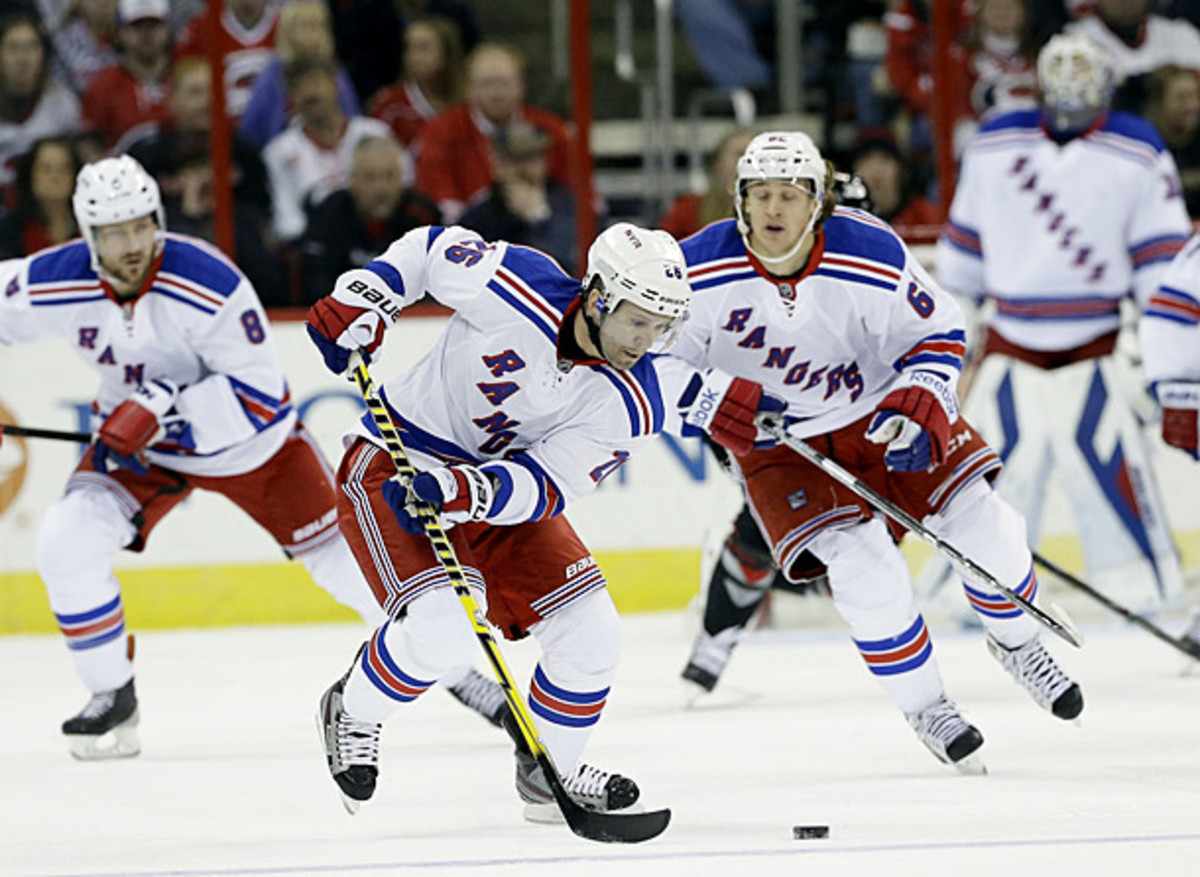Trade deadline gambles pay off for Rangers, Kings and Canadiens
Martin St. Louis has come alive for the Rangers in the playoffs after a so-so regular season. (Gerry Broome/AP)
By Allan Muir
There are no guarantees for those who play the trade deadline game. You make your deal and you take your chances.
History shows that few of these gambles pay off in a meaningful way, which is why some contenders shy away on the big day. For instance, it was the Blackhawks' plan all along to avoid the table this year. "We're really happy with the team we have," GM Stan Bowman said just ahead of the deadline. "We're not looking at [making a deal] at all. We've got a great group here. Lot of chemistry with our guys."
He makes a strong point. Airlifting talent at the last minute is a great way to energize a fan base, but there's not always a seamless transition in the room or on the ice. For every Butch Goring or Larry Murphy whose addition sparks a successful Cup run, there are dozens of Rick Wamsleys and Bill Guerins and Sergei Gonchars who show up late and bring nothing to the party.
Still, there's always the nagging sense that that one missing piece is out there. It's one thing to hold the line when you're the GM of the defending Stanley Cup champs like Bowman, but for some clubs a deadline deal offers a chance to address a fatal flaw, or provides just the edge they need to make the tournament.
It's no surprise, then, that three of the four Stanley Cup semifinalists made significant additions ahead of this year's deadline.
And not one of them would be where they are if they had not pulled the trigger.
The Rangers made arguably the biggest splash last March when GM Glen Sather swapped his problem -- Ryan Callahan, a player seeking a long-term deal worth more than $6 million per season -- for Martin St. Louis, a malcontent in Tampa Bay. With Callahan headed for free agency, Sather had to sweeten the pot some, which he did by sending a 2015 first-rounder and a 2014 second-rounder (which turned into a first-round pick when the Blueshirts reached the Eastern Conference final) to the Lightning, but that was a price worth paying for an established front line forward who is under contract beyond this season.
The early returns weren't promising. St. Louis, the 2013 Art Ross winner, struggled to find his place and scored just once in 19 regular season games for New York.
Now? The deal looks a lot better. Though he's been a streaky producer in the playoffs (six points in his first five games, zero in seven, then five in his past four) there's no denying his impact. St. Louis' personal tragedy became the Rangers' emotional rallying point when they were on the verge of elimination. Without his focus, and the inspiration it provided his teammates, it's easy to imagine New Yor succumbing to the Penguins in the last round.
The Canadiens got a boost of their own, though not exactly in the manner everyone expected. GM Marc Bergevin was universally praised for the low-cost acquisition of Thomas Vanek from the Islanders and the early dividends were promising. He revitalized Montreal's first line, averaging a point per game over his first 14 contests. But he's been the subject of intense criticism in the postseason for seeming indifferent play and a lack of discipline. His ice time has dwindled and he's already been benched once. And after taking an incredibly stupid offensive zone slashing penalty in Game 2, he probably needed an escort out of the building.
His game is off right now -- waaay off -- but Vanek historically runs hot and cold. If he starts to click, he can put this criticism behind him quickly. If he doesn't, well, he didn't cost much.
Bergevin's acquisition of Mike Weaver from the Panthers didn't generate as much excitement as the Vanek deal, but the depth defenseman has made a greater impact for the Habs. He's playing limited minutes most nights, but he's earned the trust of coach Michel Therrien who has the veteran making 44.1 percent of his starts in the defensive zone. He keeps his head up, clears his side of the ice and moves the puck confidently.
Weaver may not move the needle for fans, but he's dazzled his bosses. "I think when you bring character defensemen … you see the difference when you get into the playoffs, and that’s what [he's] brought to us," Bergevin said.
The Kings made took the biggest leap by acquiring Marian Gaborik, a sniper in decline (just 11 goals in 41 regular season games) with a questionable work ethic. But GM Dean Lombardi needed to do something to jolt his team's 26th ranked offense and, emboldened by the success he experienced trading for Jeff Carter in 2012, he rolled the dice.
It has worked out pretty well so far. Gaborik found quick chemistry with center Anze Kopitar, and the two have powered an attack that ranks No. 1 in the playoffs. Gaborik has scored a league-high nine goals and has 15 points, second only to Kopitar's 19. "There were assumptions people had about him when he came here," said coach Darryl Sutter. "I don't think those people were right.
"He's scored some big goals for us, but he's more than a goal scorer. His hockey IQ is off the charts. He's versatile. He's been a real asset for us."
That's been especially obvious on the L.A. power play. Gaborik has been on the ice a staggering 61 percent of the time when the Kings have had the man advantage, a big reason their power play is clicking along at 22 percent after sputtering along at just 15.1 percent in the regular season.

































